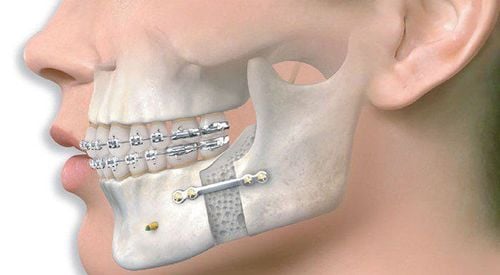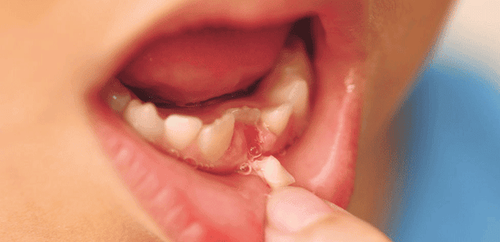This is an automatically translated article.
The article was professionally consulted by Specialist Doctor I Dang Thi Ngoc Chuong - Department of Pediatrics - Neonatology, Vinmec Central Park International General Hospital. He used to work at Children's Hospital I, Thu Duc Hospital and University of Medicine and Pharmacy Hospital in Ho Chi Minh City, with strengths in neonatal diagnosis and examination - neonatal resuscitation.
Normally, children at the age of 6 months will begin to sprout their first teeth and in the first 12 months of life, children will have about 6 teeth. By the age of 2, there will be enough 20 teeth to divide the upper and lower jaw equally. However, the sequence of teething in each baby is different, in some cases a 9-month-old baby has not yet started teething.
1. Baby teething sequence
This sequence of teething is not correct for any child, some babies grow early and some babies grow late depending on many different factors such as whether calcium supplements for children during pregnancy are enough or not.
During the baby teething process, the first molars will usually come in between 13 months - 19 months for the upper jaw and between 14 months - 18 months for the lower teeth. Children grow their second molars between 25 - 33 months old for the upper jaw and 23 - 31 months old for the lower molars.
Baby's molars are baby molars, so this tooth will last with the child's growth until the age of 6. After the age of 6, the molars as well as the baby teeth will begin to gradually fall out and move into the phase of permanent teeth replacement.
2. What's wrong with a 9-month-old baby who hasn't had teeth yet?
When the child is 6 months old, the child will start teething, but if the child is 9 months old, the teeth will be delayed.
The baby's early or late eruption of milk teeth depends on many factors, in which in addition to providing enough nutrients Necessary nutrition is also needed for the baby to practice chewing rough food to stimulate gums and genetic problems. But if teething is too late, you can take your baby to the dentist to see if he has any abnormalities.
In case the baby still eats well, sleeps well and plays normally, you can ask if in the past, you and your baby's father as well as family members have had delayed teething. If the family has a slow teething factor, the baby may also have delayed teething.

Một số trẻ 9 tháng tuổi chưa mọc răng
3. Diet for children with delayed teething
You should add calcium and vitamin D rich milk to your baby and regularly let your baby bask in the sun to synthesize vitamin D to make the calcium absorption process better.
Regarding the diet, as the baby grows, the nutritional needs of the baby also change. There will come a time when breast milk is not enough to satisfy the baby. This stage usually comes when the baby is about 4 to 6 months old. This is the time when many babies are ready for solid foods. There are no quick and easy rules when it comes to starting solids, but it's always better to start slowly. Try starting with a solid meal a day to see how things go.
Gradually transition to eating two or three solid meals a day. You may find that the more solids your baby eats, the less milk he gets. However, milk is still very important and it should continue to be a part of your baby's diet until he is at least 12 months old.
Delayed teething in 9-month-old children is not dangerous, but to avoid the risk of bad complications later on, parents should bring their children to see the dentist when they have not had any teeth for more than 12 months. In addition, parents should also apply some methods to change habits and improve nutrition to support the child's teeth to develop better.
Besides, parents also need to supplement their children with essential micro-minerals such as zinc, lysine, chromium, selenium, vitamin B1, ... to fully meet the nutritional needs of children. The addition of these essential vitamins also supports digestion, enhances nutrient absorption, improves anorexia, and helps children eat well. Parents can simultaneously apply dietary supplements and functional foods derived from nature for easy absorption. The most important thing is that improving your baby's symptoms often takes a long time. Combining many types of functional foods at the same time or changing many types in a short time can make the baby's digestive system unable to adapt and completely not good. Therefore, parents must be really patient with their children and regularly visit the website vimec.com to update useful baby care information.














